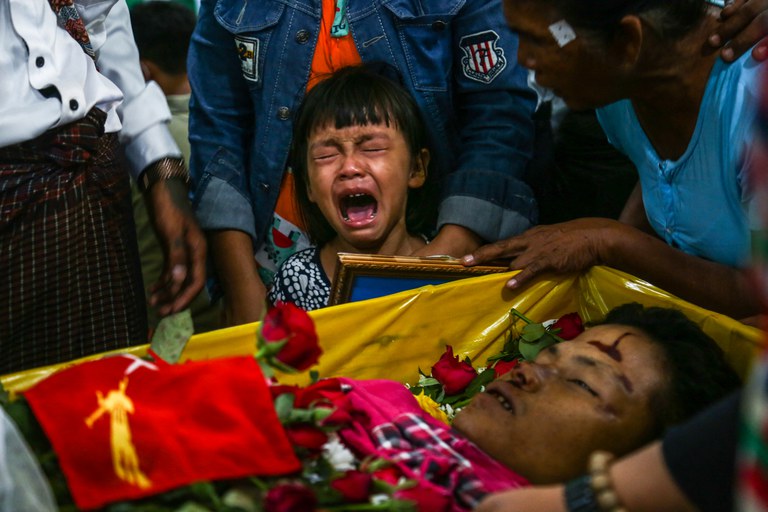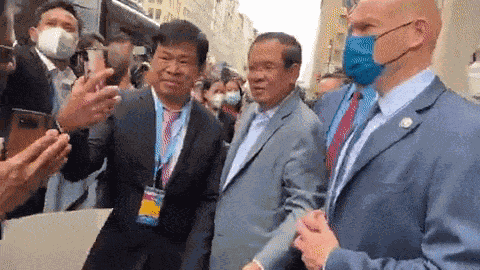
An uneasy truce is under threat in Myanmar’s Rakhine state
Tensions between Myanmar’s military and the Arakan Army (AA) insurgent group are rising in the restive western state of Rakhine, although an uneasy ceasefire remains in effect for now, residents in the area told RFA. In late 2020, the AA agreed to end about two years of intense fighting with Myanmar’s military. The ceasefire was tested in February when the military attacked two AA bases in Rakhine, prompting new clashes in the area, sources told RFA at the time. Although the skirmishes did not lead to an all-out conflict, locals say tensions remain high and fighting could soon resume. The AA’s commander-in-chief, Maj. Gen. Tun Myat Naing, tweeted a warning to the leader of the junta’s Western Command, Htin Latt Oo, as the military and the AA work to establish a presence in towns like Minbya and Rathedaung. “We saw heavy security in Rathedaung Township since about a week ago,” Kyaw Min Khaing, a resident of Rathedaung, told RFA’s Myanmar Service. “It seems like both sides are ready for a full-scale battle. There are lots of them, in full force, both inside and outside the town. So, people are worried about a renewed fighting.” Soldiers from both sides are said to be facing each other in several Rathedaung villages, including Chaung, Aung Thar Si and Hteeswe. “Our people are worried because there are similar tensions in other areas,” said Annthar Gyee, a resident of Minbya, a town of 170,000 people where junta and AA forces have confronted one another. “There could be new fighting breaking out at any time. This time it could be bigger than before. What will happen if there is renewed fighting? We are worried about the consequences,” Annthar Gyee told RFA. On May 15, the AA said in a statement that the junta was deploying more forces in Rakhine, including areas controlled by the United League of Arakan (ULA), the AA’s parent political organization. The AA’s statement indicated that it viewed the junta’s activities to be a threat to the ULA’s administrative authority. Residents told RFA that junta soldiers are stationed in Taungup, Kyaukpyu, Ramree, Pauktaw and Ponnagyun to monitor AA activities in Rakhine, especially in Muslim villages. They also urge villagers not to support the AA and to inform them about the AA’s activities. The AA has called on the public to be vigilant in case tensions boil over and fighting erupts. Junta spokesman, Maj. Gen. Zaw Min Tun, told RFA that the military is only trying to promote security in the region. “We have to do what is necessary for security. What we are seeing lately is the AA’s statements about the current worrisome situation and the possibility of renewed fighting,” he said. “So, the question we want to ask is, What kind of attitude did they have when they issued such statements? We have to think about whether they are asking for some fighting,” Zaw Min Tun said. AA spokesman Khaing Thukha said what happens next will be determined by the junta’s activities in Rakhine. “We will take necessary action, depending on the political or military moves of the Myanmar army,” Khaing Thukha said. Disruptive activities by the military have brought the people of Myebon township to the brink, Pe Than, a former member of Myebon’s People’s Assembly, told RFA. “If the Myanmar army continues to harass and arrest our people or disrupts our judiciary practices, as they have been doing, I don’t think it’ll be long until we see new fighting.,” Pe Than said. “Troops from both sides are in close proximity on the ground and if new fighting were to occur, it’d be quite intense,” he said. He said the current ceasefire in Rakhine was a matter of mutual agreement that could be undermined without clarity between the two sides. Despite a ceasefire between the AA and the military, there are tens of thousands of people that have been displaced by the fighting between December 2018 and November 2020 and are still unable to return to their homes. Translated by Khin Maung Nyane. Written in English by Eugene Whong.






